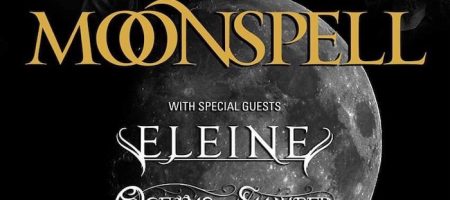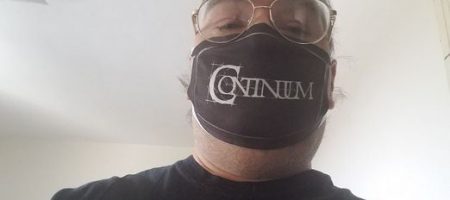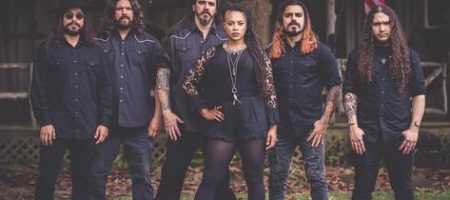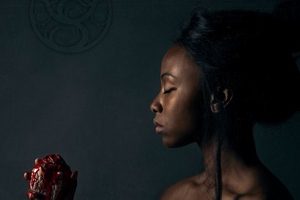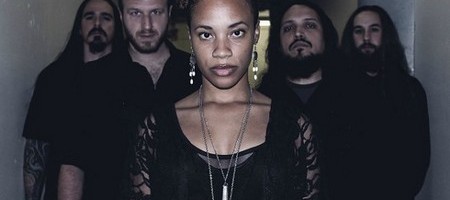Oceans of Slumber – Lessons in Folklore
Sunday, 24th July 2022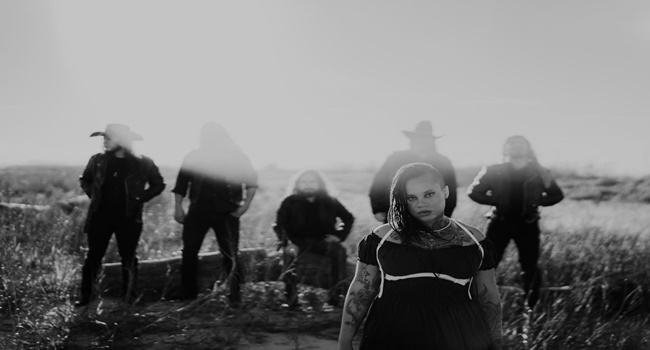
Finding a way of developing one’s own style can be an ever-evolving process. With experience and confidence, Texas act Oceans of Slumber continue to march to their own creative muse – incorporating influences rarely heard in this type of musical blend before when it comes to progressive metal/rock. The newest album Starlight and Ash may not necessarily fit any easy type of category – but it’s moving musical/lyrical tapestry should align well with those who want something unique and different to move them on personal, emotional, and soulful levels.
We spoke with vocalist Cammie Beverly to gain more insight into the making of Starlight and Ash, recording with Joel Hamilton, her newfound confidence as a vocalist, the stories behind the lyrics for this record, plus thoughts on the video medium, how the band struggles to fit certain categories or preconceptions, and bucket list hopes relating to Nick Cave and the movies.
Dead Rhetoric: The latest Oceans of Slumber album is Starlight and Ash, the fifth for the group. You chose to record this album in Brooklyn, New York with Joel Hamilton – discuss the mood surrounding the songwriting and recording sessions, and what you were able to achieve with this record that once again seems to expand upon the ambiance, atmosphere, and type of progressive metal/rock you deliver?
Cammie Beverly: The album was already finished when we decided to pursue going to record this with Joel. We didn’t do any writing when we were there but having his expertise on the final touches for the songs, and all the recording magic that is working in a studio of that caliber, it was a wonderful experience. He is the perfect secret member of the group that helped that album come together. We were very fortunate, Dobber did a lot of research for us, having the right gear to help us explore things. Joel fit right in with our mood, our message, was excited about the music and the songs.
We knew we had something special, and he felt that way too. It wasn’t just a job, or another band to him. He’s remained really good friends with us since, come down to Texas a couple of times to visit us. I think that shows the true mark that what we did was on the right path for us, we made a friend out of it too. We wanted to pursue something that was authentic, that wasn’t worried about anything else, or fitting in anywhere to make up our own minds about the things we are going to do. We wrote that music during the pandemic, and it was a big question mark whether things were going to come back or not. This is our only chance, we need to make what we want to make, and so we did. (laughs)
Dead Rhetoric: Were you apprehensive about the response you may get from your record label Century Media when you presented the final product to them?
Beverly: Yes, and no. We are very communicative, it’s not like we run and hide, then here’s the album. We were talking with them throughout the process. They are thrilled about the songs, it’s good music. They also understand they are a metal label, and this music is not as concisely what their fanbase and even what their resources necessarily could be the best for it. It’s a little bit of knowing that we’ve transitioned and changed as a band away from what they even originally signed – or thought they were signing. The label itself has gone through a lot of transition, so I think that the apprehension in when we make things is never there. Is this the best label for getting our music out to where we need it to be, in front of people that will appreciate this the most? That we will see, only time can tell, so.
Dead Rhetoric: The lyrics convey childhood memories that include dealing with life on the streets that resonate deeply through your passionate, emotional vocal delivery. How is it to pour yourself out from the mind to paper and then capture things accurately song to song – were there specific tracks this time around that presented a bit more of a challenge in that regard than others?
Beverly: What I loved about this album is musically I will approach things from this same spot in the future. When I did write this album, I asked every band member, we are close as band members, we have their families over, family dinners and things. I asked them to share different trauma and different experiences that they felt had helped shape either good or bad sides of themselves. I took those stories, mentally mulled over them, and tried to find a way for them to come together cohesively. I didn’t just have the angst, the triggered stories that we’ve come to see in things. The best way I figured to do that is I created folk stories out of them, a storyboard out of them. I changed them to not necessarily be all different characters, but the storyline of a few characters that move throughout this familial line.
It was so sweet when I shared these songs with them. The feelings had to connect, the storyline and lyrics might seem abstract, but they knew without me telling them that that song is mine, or this story is about me – and that means I did my job well. What I like about all good storytellers – village storytellers, there’s life lessons in the folklore. Here’s the takeaway… from Little Red Riding hood to Hansel and Gretel, there’s advice in it, validation to a person and what they are feeling. And that’s what I wanted in these songs. I found more confidence within my songwriting than I’ve ever had before. I’m writing about real things, and that’s going to be the key for me, being less abstract and more direct in speaking to that human condition and writing songs that are fully, unabashedly meant to connect with people on an emotional level.
Dead Rhetoric: And how did the band arrive at covering “The House of the Rising Sun” for this album – as your version is much darker than most people would expect for that song?
Beverly: We love doing covers. Every album we have done a cover as an ode to Type O Negative and how they used to put a cover on their albums. It was up in the air between “Downeaster Alexa” by Billy Joel or “The House of the Rising Sun”. Once the other songs were more finished and we were looking at the overall vibe of the album, we felt “The House of the Rising Sun” was going to fit really well. We wanted to drag it low, give it more grit and make it haunting to give the album overall more of a heavy, dark ambiance to it. We are always collecting; we would endlessly do covers if we focused on it. The fun is reimagining it, and this song is one of the most popular songs we’ve covered, outside of “Nights in White Satin”. This has a bit more crossover and is an older song. When you go up against something like that, it’s high stakes to reimagine it and do it properly. We wanted to make it our own, it’s an old song, a folklore-ish song and fit with that vibe. Carla Kihlstedt did the violin, she’s all things magical and amazing. It was a magical moment to record this, she added more magic to it. It feels almost like a new song, we are very happy with it.
Dead Rhetoric: Tell us about the video shoots for “The Waters Rising” and “The Lighthouse”. What do you enjoy most about expressing yourselves through this visual medium – does it give the music listeners and followers more insight into the concepts you wish to get across?
Beverly: Yeah, I think so. I love that we got a budget to do really nice videos. Along with the band playthrough videos those are nice, but we as a band really love cinema. Our music is meant to be in movies, we make music that belongs in movies, we encapsulate the listener all the way around. When we film a video, it’s our chance to make a mini-movie moment. We found an agency in Austin, we wanted to be able to work with them directly and not just send it off overseas or to California. FirstSight Agency, they are phenomenal, there is a mix between a song coming to life the way you envisioned and someone working with you – because there are limitations with budget, personnel, and time. With finding our agency to work with all those variables, they still delivered something that makes you happy and is true to your vision which is something special.
It’s always amazing to me to have nothing, and then we made a song. And that song inspires others, and then you make a video, and these are tangible, visible things that we can share to many people that was nothing. It’s this big, colorful presentation. The awe in this is not lost on me. I hope that I feel that these videos do give a little bit of insight into how my mind feels about the songs. We live in a visual age, MTV back in the day, it is the age of the video star. In playing along with that, if we can make poignant videos that impact people to really take them out of their mind for the moment and put them into this experience, that’s the escape that I am trying to make people have. It’s sort of like if you have ever done psychedelics, or know people that have done psychedelics, they do soul searching and sometimes getting to the happy parts you have to get through the sad parts, and acknowledge those sad parts.
I feel like that our music is like a psychedelic drug dose – takes you through all these emotions, and it may not be the ones you thought would come up, but they are going to help you get to that place you need to be, that place that would be healing or let go of these things that you were holding onto. That’s what I envision for the songs, and I feel like the videos help. That atmosphere that keeps people’s attention, and let the world wash away a little bit.
Dead Rhetoric: You mentioned in our last talk that the studio for you is like going to the doctor and telling you that everything is wrong – being under a microscope to be surgical and exact. Did working with Joel this time offer more comfort and understanding of what you are able to do with your voice – your uniqueness that you bring to the table for Oceans of Slumber?
Beverly: I think that working at the studio, with Dobber and Joel at the helm behind the glass, instead of being in a booth I got the whole room. It’s a beautiful, modern, kind of rustic aesthetic that the room has. I always had the light dimmed. I have a lot of anxiety when I go into the studio. One thing I appreciated about working with Joel, the style it wasn’t about precision or perfection. He understood without all the back and forth, without this outlying conversation what I needed to get out, the best thing to get out. There was very little punching in, it’s what made me feel in the past that a word was wrong, or the pronunciation was wrong. If I could get the songs out in one take, he wanted me to do it, sing through as long as I want. It made it flow so much better. I did gain a lot of confidence this go around that I didn’t have previously. I’ve come to realize that a lot of that negative view or negative self-talk or apprehension that I have is my own for me to figure out. I do feel like at least I know how to use this tool, it may not be perfect to me, but I am a master of this tool. Acknowledge it and keep working with it, not give up to let my anxiety win.
Joel isn’t the kind of person that is going to bullshit somebody. Confidence is a big part of delivery. I have to get out of own head sometimes.
Dead Rhetoric: Now that things are opening up for touring, you are gearing up for a North American run in late summer. Considering you weren’t able to really tour for the previous self-titled release from 2020, will this be a challenge to present your two latest albums in a fair way as well as getting to some of the older fan favorites?
Beverly: Yeah. It is really tricky; we’ve laid out the songs for what we want to do. We did keep in mind that people want to hear us perform the last couple of albums and those songs and then yeah, even before that. That’s a challenge for anyone that has a growing discography. There may be whole albums that bands skip and don’t play a single song from, and that can be frustrating for fans. We have a good set; we’ve tested it out here in Houston that covers what people want to hear. We didn’t have after the show the ‘we really wish you did this’ talk. It is something we always keep in mind, and does pose a unique challenge, especially with the hiatus of a year with an album we never did live. We may have to do a revisit tour, it’s sad that our last album didn’t really have any live coverage.
Dead Rhetoric: Do you feel overseas audiences have been receptive to your work because of the type of tours you’ve been a part of – and are in general more open-minded to the various styles you incorporate, compared to many listeners domestically?
Beverly: I think there is.. I’m not entirely sure why it is, and why that happens, but we have a much bigger fanbase overseas. Germany, the UK, the Netherlands, Greece, Turkey, there’s just these huge markets for us over there because of the access to music they have over there, as well as other artists for this genre that are more prolific over there in general. Over there, it’s countries – it’s different people, it’s different cultures, everybody is in their own country dealing with different nationalities all the time whereas for us, it’s one whole country for all that stuff. We have our own sort of hang-ups and cultural barriers, and trends, that overtake people being more open to new things or able to just listen and see things differently. That’s what we face in the US. Europe, female-fronted or symphonic metal was created and thrives there. Not that we are symphonic metal or anything, it’s just that whole genre doesn’t view anything there the same way they do in the US.
Speaking to the contrast, people here are a lot more superficial at first as in what does the band look like? There’s this black woman fronting this, so I don’t know about that. What they go in with, can tend to inhibit what they could get out of it or what they could listen to. I’m all for moving towards genres that describe what you are going to feel versus what you are necessarily going to hear. And that’s what I like using about the term southern gothic, or southern gothic rock. Instead of saying there’s going to be blast beats and guitar riffs, by saying it’s southern gothic you don’t know what it’s going to sound like, but you do have a certain sense of the vibe. Rather than hearing it’s symphonic metal, progressive metal, doom / death metal, if the band has any inflections of anything else, everyone is flipping out. We merge our own styles to create a bit of our own style, so how do we … it doesn’t work to use the old genre tags as it doesn’t describe what we are doing. It would be easier if the expectations weren’t in the titles, I don’t think it’s necessary.
Dead Rhetoric: Where do you think you’ve seen the greatest evolution (or transformation) in yourself as a person that has shaped your outlook on life from your twenties to how you view things now in your mid-30’s?
Beverly: I was talking to Dobber about this personal question. In my twenties I spent a lot of time running from myself and running from my problems. Things weren’t going right, and if I was overwhelmed, I would turn my life on a head. Break up with a guy, move to a different city, take up a different job. I would leave things, leave people, and never had to face myself. I met Dobber in my late-twenties, I settled down in a sense, settling down in him and within our relationship and our love, in this new passion I had found. When my traumas come up, I don’t have a life I want to run from, I have to stay and work through these things. Work through these issues and work through myself to get to accept the things that are changing, accept myself and continue to change without run away from (the problems). You can’t always start over, sometimes it’s about mending things or letting things go. That’s one of the main differences. I had such an anger and resentment for struggles, I thought I was leaving them when I was just hiding from them. One thing I am facing in my thirties now is facing those problems, sitting with them and learning how to let go so they don’t keep resurfacing. My work ethic has changed because your routines change. We have a child in our lives, a house that we own, what is this? Learning to adult, realizing that you are just older as an adult, and still are trying to figure out what you are doing.
Dead Rhetoric: If you had the opportunity to create a high school or college level course about any subject outside of music, what would you like to teach and why?
Beverly: Oh wow, what a wonderful question. I would teach something along the lines of self-growth. Interpersonal relationships. It would focus on women, the transition of womanhood and psychology. As a woman you go through a lot of changes, and milestones. They are almost broken up into three or four quarters. Pre-puberty, puberty to motherhood, motherhood until menopause, and after. You are a critically different person at all those stages, because your whole chemical and psychological composition has changed. And I wasn’t prepared for… I thought I would reach 25, be fully grown and that’s that. Maybe you want to have kids, and you have to look at your body completely differently.
You don’t get prepared for that. It’s a male-centric world, it’s male ideas and male opinions first, and it’s oriented towards the he. There is still a lot of Christian taboo or general taboo about women and women’s expressions of their bodies. Not like women’s lib, but the transition of people, the transition of psychology. Holding onto that essence of creativity amongst it all. I have watched a lot of women leave their career after they have kids, I feel like there is a unique thing of a woman creator to balance being a creator and having children, going on the road and doing things, that all would be very different. Because it’s something I’m looking for help with, then I could learn, and enough people… it’s an artsy type of course that may not help towards your degree, but you would be happy that you took.
Dead Rhetoric: What do you think are some of the toughest aspects for the average fan or follower of Oceans of Slumber to understand when it comes to specific decisions that have to be made for the overall health and well-being of the band?
Beverly: That we are people at the end of the day. I guess it’s like, there are lots of behind the scenes and the not fun part of being in a band. The administrative side that people don’t see. Dealing with the label, finding a manager, putting tours together, looking at agents, it’s getting paid, it’s publishing, all that stuff is not fun, not cool, and generally does not go smoothly whatsoever. And how that effects your output as an artist, whether or not it makes continuing a band worth it when things go too wrong. You have a wonderful business that spreads joy throughout the community, but if you have a sewer line that keeps breaking and bubbling up into your business, you may not want to work there anymore. We strive really hard to get ourselves out there to people that will like us. It’s a service to them. You are a fan, you want this music, you need this thing, and thank you for making this music. If it gets too hard to do, and such a fight with all those things on the back end, that’s why changes happen and bands output changes, or bands stop. Dobber and I are committed to making music, one way or another. We will always have a band together, it’s something we need between us. It may not be from the same outlet, but don’t lose hope or don’t think we’ve stopped if something changes.
Not saying Oceans of Slumber is going anywhere, but those are things on the back end that make your hands get tied. A song gets taken down, we are like ‘we didn’t take it down’. There’s so much business to this, for non-business minded people you can get overwhelmed and agitated about it too. We are people with real lives, real bills, trying to make music that they love, on top of dealing with the mechanism that is the music industry, and it’s not meant to help you succeed very easily.
Dead Rhetoric: What’s on the bucket list for Oceans of Slumber to achieve – or yourself personally as a musician? Are there specific musicians you would love to work with in some capacity down the line?
Beverly: I would love to work with Nick Cave. While he doesn’t tour with anyone, he could. And then… having one of our songs be in a film, or a television show. That is something I want as an artist. I want that crossover of mediums. It’s so amazing when artists to me can lend their things to other artists. Music and movies, it would be amazing to have that happen. It would be a bucket list accomplishment, and what I would want as an artist.











